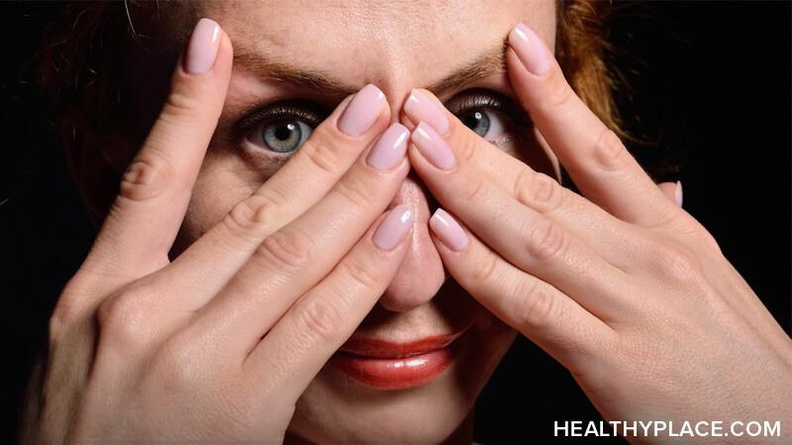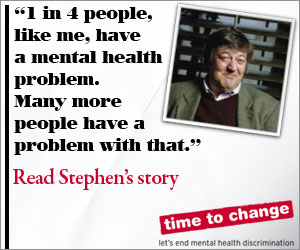Fear, False Beliefs and Blame in Mental Health Stigma

You know someone who has a mental illness. You actually probably know tens of people with mental illnesses. There’s a twenty percent chance that you have a mental illness yourself.
If this problem is so common that literally everyone in the world is affected by it in some way, then why are we still so ashamed to talk about it? It’s easy to just chalk it up to stigma around mental illness but, unfortunately, the puzzle is much more complex than it seems.
As with any problem, it is best to start by breaking it down into manageable bits.
Fear: A Necessary Component of Stigma
 Although everyone has their own unique list of fears, most can agree that, in general, we fear what we don’t understand. And when that thing we don’t understand, like mental illness, gets portrayed in a negative manner through the media, we simply start to fear it more.
Although everyone has their own unique list of fears, most can agree that, in general, we fear what we don’t understand. And when that thing we don’t understand, like mental illness, gets portrayed in a negative manner through the media, we simply start to fear it more.
The media has led the public to believe that people with mental illness are more violent than the general population. In fact, the majority of people who are violent do not suffer from mental illness, according to the Canadian Mental Health Association. However, people with mental illness are in fact 2.5 times more likely than the general population to be victims of violence, not perpetrators.
So what are we so scared about? If people took the time to read the literature on mental illness and violence, they would soon figure out that they in fact have nothing to be scared of at all.
False Beliefs About People With Mental Illness
The belief that someone who has suffered psychosis cannot be re-integrated back into society. The belief that someone who has schizophrenia cannot hold down a job. The belief that someone with borderline personality disorder is unable to have a healthy relationship.
All of these false beliefs lead to increased stigma. And the only way we can lessen it is by touting the success stories of those who have battled, and beaten, mental illness.
Blame and Self-Stigma
Unfortunately, a lot of people are blamed for their mental health conditions. I would guess that most people with major depression have been told more than once to ‘buck up and stop being so miserable’ or ‘we all have problems. Deal with it like everybody else.’ (read Best and Worst Things to Say to Someone Who is Depressed)
Far-removed from physical illness, people with a mental illness are often blamed for having it. It's like it was some kind of choice they had and if they would have done this, or not done that, they would be ‘normal’ like everyone else.
No one chooses to have a mental illness. Just like no one chooses to have cancer.
Since there is so much blame put on the shoulders of those with mental illness, it is very common to start believing that maybe it is your fault.
It’s not. And anyone who believes it is horrendously misinformed.
The Completely in Blue website is here. Chris is also on Google+, Twitter and Facebook.
APA Reference
Curry, C.
(2012, May 14). Fear, False Beliefs and Blame in Mental Health Stigma, HealthyPlace. Retrieved
on 2025, November 9 from https://www.healthyplace.com/blogs/survivingmentalhealthstigma/2012/05/fear-false-beliefs-and-blame-in-mental-health-stigma
Author: Chris Curry
It took me until I was 53 years old to realize my gift. A GIFT that I share with a great number of visual Artist, performers, scientist, inventors, writers and a few politicians. We are innovators, SPONTANEOUS, HILARIOUS and masters of CREATIVITY. We are not afraid to color outside of the lines. We do not follow the path that others have set, we plow our own highways ( mainly because the people that try to lead us are often moving too slowly and are afraid to deviate from the standard "hive-mind" marching drills). We are blessed with a deeper respect for the feelings of others because we have been ridiculed by standards that do not respect the freedom of thought that we need to express the new and different. CRAZY is not an insult to me, (it makes me giggle) especially when I witness people grab an idea that this "crazy" person has suggested, implement it and change how they perform certain tasks, or consider a certain situation. My suggestion to other ADHD folks out there is you might want to find a nice Artist group like I did, or create an Artist group like I did and improve the neighborhood, like WE did. Offer Art, music, poetry, science or communication with a dash of acceptance... let everybody know that we are here to stay. When they call you "crazy" giggle in their face, if they giggle back, they are likely to accept you, other wise they will run from you..this is MY way of weeding out the people who will potentially drag me down for my non-conformity. The absolute hardest thing to do is learn to accept yourself (I'm still learning this). We can and will be our own worst enemy. I Love you..you should try it!
The thing I try to keep in mind is that most people are terrified of mental illness. When they find out that someone they know has a mental illness it brings home the fact that it could be them or their spouse or child or best friend. ..or anybody and it scares them. When people imply that if you had or hadn't done something you would be normal they're simply hoping that they can protect themselves by doing or not doing those things.
I also try to keep a sense of humor about it. I had one friend tell me she didn't believe in bipolar disorder which I think is hilarious. I told her I was going to tell my doctor that I wasn't going to come in anymore because I didn't believe in BPD.
When people tell me I'm using mania as a excuse for bad behavior I ask them sweetly what's their excuse? And 99% of them tell me! People are too funny.
I'm debs , and have commented on many healthy place articles . I am an addict 5 yrs in recovery , and have saviour ADHD and 50 yrs . Am getting divorced which has contributed to depression and anxiety . In honest truth before my 25 yr marriage and 36 yrs of being together , apart from ADHD I was carefree dizzy scatty and nothing ever troubled me . But cicumstances of life changed this . Long story but my husband I see now controlled and emotionallyabusied me . My eldest son bedame an addict as well . My husband whom is powerful and wealthy always thought as he worked hard , he never deserved scum as wife and son . Last year had affair with my best friend . I'm not looking to blame especially my addiction on anyone . But Michelle wish you would speak out . I do as I no I was grounded to rock bottom my a man whom 100 percent blames our divource on me. Not night after night I sobbed to sleep . When I wanted to die screaming at him for following saying disgusting addict over and over untill I locked myself in bathroom making my skin bleed as that was relief from his degrading me . I never want people to go through this and I do tell my story , never to his friends or colleagues but to those who need support . My best of times was working in the priory where I did my rehab was Volonteer for few years , oh that gave self worth to me , but with abuse had to stop . Lastly this story is fact and not a poor me as I have 2 boys I love unconditionally , now fantastic friends and my sister her husband and family who I love to death and I hope soon with solicitor and judje a lovely home no financial worries and want to fight to keep my home in Antigua and why all that because for first time I am fighting for mine and boys future xxxx ps thanks Amanda many a night you've given me the will to stay strong plus Whitney "I didn't know my own strength "" listen to it xxxxxxx debs xx
the gift of crazy !!!
why we look at mental extend as an illness? in my experience its more to Social influence has a great power. It controls how humans live their lives starting from what they wear to how they talk. It is the generator that moves mankind to act in a situation. Social influences play most of the biggest part of human behaviours and were studied by how human beings confront any critical situations like a bomb or the hijacking of a plane. Basically, social influence is described by (Mayers, 2010) as what people do under stress or in a critical situation, under the influence of society. Social psychologists studied social influence categorising it to conformity, ego self-justifying signs and compliance (Crossley, 2005).. i suffered from bipolar and i was on medication for more than 15 years , by working on my self medicating (addiction) i came to understand a very important thing, is that i dont have to rely understand i only need to act, recovery is for real, but only people like me are to smart to serenader , thank you its a great read.
I am speechless lol... If you knew me you would know that it is uncommon to find me in that position! The only thing I have to say is, I agree with everything you have written.
I would have to agree with you Michele. Perhaps that is something I will touch on in a future post. Thanks for your comment!
I agree with you completely but also I think people think that mental illness = crazy. No one wants to known as crazy so we keep it inside. At least that's how I feel.
Michele